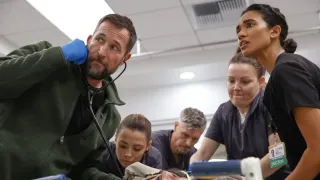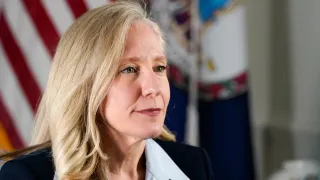January 25, 2024
Queering Cinema: Celebrating the Iconic 'Beards' Who Have Broken Our Hearts on Screen
Jake Myers READ TIME: 7 MIN.
Julianne Moore in "Far From Heaven"
In the 2002 Todd Haynes film, (a remake of sorts of the Douglas Sirk classic 1955 film "All That Heaven Allows") , Julianne Moore plays the ultimate homemaker, mother, and wife to husband Dennis Quaid.
As the story unfolds, the pristine world of Julianne's character, Cathy, beings to crumble when she gets a call saying her husband, Frank, has been arrested for suspicious behavior. When she picks him up, he says it is all a misunderstanding, when he's actually been exploring the illicit underground world of gay bars in Hartford. Eventually, Frank breaks down and tearfully tells Cathy that he has fallen in love with a man, and wants a divorce.
Julianne plays the character with a realness that only she can, leaving us basking in the tenderness of her unrealized love.
Michelle Williams and Anne Hathaway in "Brokeback Mountain"
Perhaps known as the gay film of all gay films, "Brokeback Mountain" (which obviously should have won the Best Picture Oscar), makes us want to die of a broken heart...in a good way.
Fortifying the anguish are two powerhouse actresses, Michelle Williams and Anne Hathaway, both of whom deserve to be mentioned here in our roundup, as they tragically pin their hearts on their closeted cowboys. As ranchers in the 60s would do, Heath Ledger (Ennis) and Jake Gyllenhaal (Jack) hide behind their hetero romances as a way to assimilate into a life expected of them.
Williams, who plays Alma, is Ennis's long-time fiancée, and Hathaway, who plays Lureen, is a wealthy rodeo rider. Both of them end up marrying and having kids with the star-crossed cowhands, fating them to years of quiet confusion about why they don't seem to be quite enough to wrangle the wandering eyes of their men.
We always love a shocking revelation scene, which we get when Alma (Williams) inadvertently witnesses a passionate kiss between Jack and Ennis, when reuniting after four years apart.
The climax of the film occurs when Hathaway (Lureen) tells Ennis that Jack, presumably killed in a hate crime, wanted his ashes scattered on Brokeback Mountain, showing that Jack loved Ennis, despite his difficult nature. Heart. Breaking.
Keira Knightley in "The Imitation Game"
Our final powerhouse performance rests with Keira Knightly, who demonstrates the utmost compassion for her secretly gay man, partly because she herself understands what it means to be marginalized.
In 1939, newly created British intelligence agency MI6 recruits Alan Turing (Benedict Cumberbatch) to crack Nazi codes, including Enigma -- which cryptanalysts had thought unbreakable. Turing's team includes Joan Clarke (Keira Knightley), who ultimately becomes his fiancée. In 1952, the quiet genius encounters disgrace when authorities reveal he is gay.
As the lone female involved in deciphering Enigma, Knightley must sneak about to contribute to the effort, since it is considered "indecorous" for a single woman to work and share living quarters alongside men. The best scenes involve Clarke and Turing, who confide in one another as equals–especially since both must hide their true identities.
Clarke (Knightley) is amazingly unfazed at the revelation of her man's sexuality. In fact, after Turing endures chemical castration to avoid going to prison (gasp!), Knightley portrays heartfelt empathy when she visits him in his home, and comforts him by saying that his work saved millions of lives. Her portrayal remains an unwavering example of a woman's ability to channel understanding and strength, as her man struggles with a cruel and punitive world.






